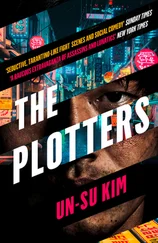Bursting into laughter, Maria gushes, “Sweetie, thank you so much, that was so nice of you to think of Mommy and Miss Suzy.” She throws one of the bigger crumbs into her mouth and then exclaims, “Yumm, it’s really yummy, but now we’ve got to get you to the ladies’ room to clean up!”
Maria Sutpen seems oblivious, which must be why Grace was drawn to her. Too ordinary, made to be a girlfriend, a mother. She even looks natural in a blow-dried bob. She takes whatever’s given without much ado, even something as odd as a used ring or an entire house. The sort of woman you would find anywhere, whom you would never notice or remember, because, despite her mixed colors and name, she is your average all-American girl.
Finally, Maria looks up, her eyes glazed, as though her world has now ceased but for the little girl in her arms. “Please let me know if you hear from her. I’m worried about Grace. And about the letter, maybe we better wait.”
Suzy makes no response. She barely hears Maria saying, “Since Grace specifically told me not to open it. I mean, she might have left me a message at home by now…” Without letting her finish, Suzy mutters finally, “Was it Grace who gave her the doll, the one named Suzie?”
“My fairy godmother did!” It is little Grace who jumps at the question. “She made me promise to take good care of her, because Suzie’s all alone in the whole wide world!”
ALL SHE CAN SEE ARE LINES. Lines to the entrance, lines for applications, lines for registration, lines for interviews, lines for hearings, lines to public bathrooms which are locked with “Out of Service” signs on all forty-two floors except three. She is not sure what made her come here. Everyone under the sun is here. The fluorescent blue makes everyone look sick. Or perhaps it is the perpetual wait that turns golden skin ashen. Men in stiff black uniforms trot back and forth with patriotic salutes. The objects of surveillance are aliens. Because here, at 26 Federal Plaza, “aliens” is the preferred name for immigrants. Ten-thirty on Monday morning, anywhere in the world would be better than here.
She could have said no. The call came at the last minute. The court’s interpreter went home sick, and they needed a replacement. Immigrant hearings are rare. The court sticks to its own certified interpreters, and the agency mostly handles depositions that pay much higher fees. Even the voice sounded reluctant when it left the assignment on her machine. But the minute Suzy heard “26 Federal Plaza,” she grabbed the phone. It seemed unthinkable not to take the job.
26 Federal Plaza.
The largest civilian federal building in the country.
The home of the Immigration and Naturalization Service.
Returning to the scene of the crime.
Passing the metal detector, Suzy wonders if her parents were summoned here regularly, if they were led through some secret corridor, if they sold off their fellow Koreans in this very corner. Suzy imagines little Grace next to them, her face lowered, her eyes filled with tears. She surveys the crowd in the sprawling lobby, searching for the INS employee who might have lured her parents, who might have given the final order, who might have turned his face away when they got shot. But nothing. Not a trace. The INS is never clumsy in its tracks.
There are thirty-two courtrooms spread over three floors. Courtroom 30 is located on the twelfth floor. By the door is a young woman in a navy suit pacing the floor and whispering into a cell phone, “No, it’s not gonna take long. Just a formality, really. Williams never grants relief.” She takes no notice of Suzy, who is now entering the room marked “Judge Jack Williams.” There are three wooden pews on either side, with two booths and desks in front. Hanging behind the judge’s bench is a circular bronze plaque that reads “ Qui Pro Domina Justitia Sequitur ,” with an eagle perched in its center. It is a plain room, clean and deeply worn. Yet enough to set one’s nerves on edge.
Squatting in the right booth is a gray-suited man with his nose buried in a pile of papers on the desk. All Suzy can see is the wrinkled forehead and the drooping chin. But all too familiar. One thing she has noticed through the months of interpreting is how lawyers resemble their clients. They begin wearing the same look. The same optimism, the same despondency. A quick glance, and she can usually surmise the situation. Whatever today’s case is, there’s not much hope.
Next to him is the defendant. Either she’s been crying up until the point when she was summoned here, or her eyes are naturally swollen with dark circles. Her gauntness is alarming, the brown cardigan falling shapelessly over her bony shoulders. Her wizened face carries the yellowish hue of someone who hasn’t breathed fresh air for a long time. It is hard to guess her age. Somewhere in her late fifties, although with immigrant workers one can never tell. She looks vaguely familiar, though, and Suzy leans for a better look. But unlike most witnesses, whose faces light up at the entrance of the interpreter, the woman does not even stir when Suzy slides into the seat next to her.
“Hi, I’m the interpreter assigned to the case,” Suzy attempts. The woman seems not to hear her, muttering instead a few indistinguishable sounds under her breath. The lawyer barely acknowledges her. Occasionally Suzy has run into lawyers who don’t address interpreters or stenographers directly. Some even snicker when she stumbles on a word and turns to a dictionary. They might sigh noisily or make a point of shaking their heads. Oddly enough, Korean lawyers are the worst. It might come from the country’s long history of class hierarchy. Once, an attorney turned to her during a break and asked her to bring him a cup of coffee. Suzy collected her things instead and walked out. Sometimes bullying is a legal tactic to prevent a witness from being questioned: get the interpreter mad and bust the deposition. A cheap trick, but it works. Most depositions never get rescheduled. They cost too much. Before the second try, the case gets settled.
But no such play at an immigration court. No cocky lawyer, no tempestuous interpreter. There is a grimness here she cannot shake off Silence infused with doom. Like the end of a civilization, she thinks, peering at the woman, who still won’t raise her face.
Then, almost simultaneously, the young woman with a cell phone strides in, and a lanky man in a black robe with bifocals precariously perched on his nose emerges from the side entrance by the bench. The new presence does nothing to lift the ominous air. The defendant recoils slightly.
“Let the record reflect that we are now commencing the removal hearing of Jung Soon Choi,” the man with bifocals, who turns out to be Judge Jack Williams, says, turning on the tape recorder. At immigrant hearings, stenographers are rarely used. The court does not have the budget. Facing both lawyers, Judge Williams asks, “Do you, Counsels, wish to present your exhibits?”
Right away, the young woman and the morose lawyer strut to the bench. While the three are poring over the documents, Suzy studies the defendant more closely. A creeping sense of familiarity; what is it? Why does her heart give at every frail motion of this woman?
When both return to their seats, Suzy rises and takes the oath, as does the woman. As if on cue, Judge Williams pounds and says, “For the record, please state your name.” Suzy translates in a louder voice than usual, for fear that the woman might not hear.
In a surprisingly clear and coherent tone, the woman answers, “Choi Jung Soon.”
“Is that your lawyer sitting next to you?”
Mrs. Choi nods, at which Judge Williams orders her to answer verbally.
Читать дальше












